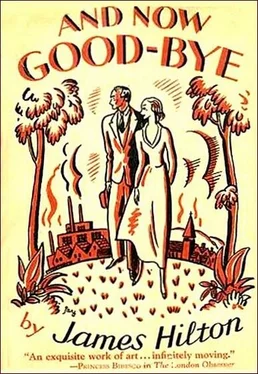Howat crumbled his bread uncomfortably. “But, my dear, what could I have noticed? I merely taught her German. She behaved quite’ normally while she was here, if that’s what you mean. And I do think that it would be better to refrain from judging the matter until—at any rate—we know a little more about it.”
And with this very mild rebuke, which he did not for a moment expect to have any effect, he relapsed again into silence.
During the afternoon he ‘visited’. He believed that it was no use preaching at people merely; you must go and see them in their own homes and get to know them personally. He had always been regular and conscientious in so doing, but he did not, despite that, reckon himself a good ‘visitor’. He was pretty fair with people who were in any trouble or who needed the more straightforward kinds of advice, and he was all right with people who happened to attract him personally, and he was always a huge success with children; but there were a few persons who came into none of these categories. He was never quite certain whether they dreaded meeting him as much as he dreaded meeting them; and for the sake of this meagre doubt he kept up the practice, till, after several years of it, he had developed a barely adequate technique of small-talk suitable for such occasions.
This afternoon he did a rather strange thing; he thought of all the people he least liked to visit, and visited them one after another. He did not quite know why he did this—not entirely, anyhow, to mortify the spirit, and certainly not at all with any idea of ‘getting them over’. On the contrary these visits were to be extra ones—surplus dividends, as it were, from the store of loving kindness in his heart. He thought: If I’m going to be any good in this town, I’ve got to dive far deeper than I’ve done hitherto. Yesterday, while I was with Miss Monks, my feelings were absolutely selfish—I was thinking all the time what an old tyrant she was and wondering how soon I could decently get away—that, remember, with one of my chapel-members lying on her deathbed. After all, what do I do in this town with any enthusiasm except the things I like doing?—I like pottering about with children and young people, I like giving talks on literature and music, I like preaching, too, in a way—I like all these things, and therefore I do them. It all boils down to the fact of a rather stupendous selfishness masquerading as virtue; the truth is, I’m no better than anyone else—I like what I like. But as a parson I ought to be different—yes, better—or else, in Heaven’s name, why do I wear this collar the wrong way round?
So, in a state of self-disgust that only gradually wore itself out, he visited old Jack Harmon, who was nearly stone deaf and was interested in nothing but Association football. Not only had he to be shouted at in a way of which his daughters alone had acquired the perfect knack, but his voice, when he spoke, was a barely coherent muttering to which nobody in his house ever paid the slightest attention. Howat, moreover, was not learned in football, and could only vaguely follow the gist of the man’s talk. The pleasure his visit was giving was, however, obvious—too obvious, perhaps, since the old man, delighted to entertain the parson in a room which directly overlooked the street and through whose window every passer-by could see, clucked and gurgled his satisfaction till the saliva dribbled inelegantly down his chin. Howat shouted “Yes” and “No” and “Really?” while the pain in his throat, rarely absent altogether, became a white-hot ache; then, after about an hour, he managed to drag himself away, pursued even from the street-door by the man’s joyful incoherencies.
Next he called on Mrs. Roseway in Hill Grove (he had intended visiting her the previous day, but had put it off with an excuse which, he knew now, had been merely a disguise for selfish personal reluctance); she was eighty-four, and did nothing but grumble because she had rheumatism (“By Jove,” Ringwood had once said, “it’s time she had something!”) Howat had never been able to make any headway against the quiet, almost contented querulousness of this old creature; she was fairly well off, yet (again quoting Ringwood) ’you couldn’t get a penny out of her without chloroform’. She had children, hard-working but unfortunate, living in neighbouring towns, and Howat always hoped he might some day persuade her to deal more generously with them. He had often come near to the point of broaching the matter, but had never quite managed it; this afternoon, with new determination in his heart, he decided that he would. He listened for a time to her complaints, and then began a plea for greater charitableness and help towards those in need of it, till at last the old lady, shrewdly perceiving where his eloquence might lead, shut him up with a quite final if not very courteous remark and resumed the more satisfying topic of her own ailments.
Then he visited Joe Maracot, a former chapel member, now turned atheist, who had fallen off a lorry and fractured a leg. Maracot treated him with scarcely veiled hostility; he was a strong Labour enthusiast, an admirer of Councillor Higgs, and tried to lure Howat into an argument about Russia, but Howat, feeling himself being baited, declined to be drawn.
Then (purely as a treat for himself) he looked in at the Infirmary and spent half an hour in the children’s ward. After that he called on the two Miss Jekylls, who talked endlessly about foreign missions—a department of religious enterprise for which he had never, somehow, been able to share the optimism of its partisans. The continual twitter of the two ladies bored him (try as he would he could not help it), and their vision of an Africa perfected by frock-coats and hymn-books had that large simplicity that always affected him with a certain sadness of mind. And yet, he felt, the Misses Jekyll were very likeable; they believed in their vision and subscribed money for it with far more generosity than they could really afford (there was a little box for ‘missionary pennies’ behind the clock on the mantelpiece); they thought as kindly of an idealised black man bowing down to wood and stone as they did harshly of the real unfortunates who lived within a quarter-mile of their own house. If only Howat could give a twist to that pathetic stream of good will, could bring it nearer home and canalise it so that it ran in a warming current through the streets of Browdley! He tried valiantly, but as fast as he mentioned local hardship, the two ladies romped merrily along to some other instance of wholesale conversion in distant lands—“over a thousand baptised last month in India alone, so my missionary cousin writes to me.” Howat forebore to reply that during that same month in India there must have been at least a quarter of a million non-Christians born; he felt so sure that they would be offended as well as unable to see the point of such a remark. He just let them talk on, accepted a cup of tea and a piece of cake, and then, after many mutual assurances that the visit had been enjoyable, took his leave.
Lastly he visited an old man, a former chapel caretaker, slowly dying of heart disease; the man was obviously too ill to talk or to want to be talked to, and Howat did not stay more than a few minutes.
By that time it was time for ‘high tea’ at the Manse.
After tea he went into his study and prayed. He did not kneel or even bow his head; he just sat back in an armchair before the fire and shut his eyes. He did not want his wife or Aunt Viney to come in (as they would often do without knocking) and find him in an obviously prayerful attitude; not that he was ashamed of praying, but prayer to them was such a professional business, something a parson did night and morning, a good deal on Sunday, and occasionally at other people’s bedsides; he was sure they would think him ill if they caught him at it on any less customary occasion. Besides, his wasn’t a definite prayer; he didn’t put much of it even into words; it was just an expression of the feeling of worthlessness that had come over him, the doubt as to whether he was doing any good, and the desire to be given (if it were possible) some secret reassurance.
Читать дальше











